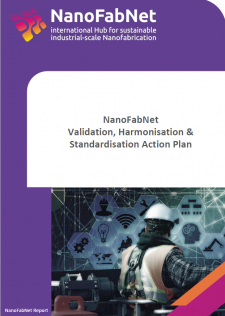
Sustainable nanofabrication: NanoFabNet publishes its actions plan
To address the issues of validation, harmonisation and standardisation identified as barriers to the industrial deployment of sustainable nanofabrication, NanoFabNet is putting the issue of characterisation and metrology at the heart of its actions plan.
NanoFabNet: ensuring the quality and safety of nanotechnologies
The European NanoFabNet project brings together some fifteen partners responsible for identifying the needs and viewpoints of the various stakeholders (industry, regulators, risk assessors, NGOs, etc.) with regard to the sustainable development of nanotechnologies and for identifying the solutions to be provided. LNE is responsible for discussions on validation, harmonisation and standardisation issues.
An initial report on the needs expressed by stakeholders on these key issues for the field was published in July 2021. It identifies characterisation and metrology in particular as major obstacles to the industrial deployment of sustainable nanofabrication.
Characterisation and metrology: a 5-point action plan
To overcome these obstacles, the report drawn up by LNE with the help of the NanoFabNet project partners recommends around fifteen actions and a short, medium and long-term implementation schedule. Five of the actions envisaged directly concern characterisation, testing and metrology issues:

- Improve the visibility of existing standards and reference documents;
- Create a place to foster pre-standardisation activities and act as a bridge to the world of standardization (CEN, ISO, ASTM, IEC) and key initiatives in the field, such as the Versailles Project on Advanced Materials and Standards (VAMAS) for which LNE represents France on the Steering Committee;
- Harmonise and validate characterisation and testing methods;
- Set up a funded programme to support the implementation of inter-laboratory comparisons essential for the validation of characterisation and test methods considered as priorities by European stakeholders;
- Organise and coordinate a proficiency testing service to enable characterisation and testing laboratories to demonstrate their ability to master measurement methodologies and associated protocols, and support the development of ISO/IEC 17025 accreditation scheme where appropriate.
Creating of the NanoFabNet Hub
Launched in 2020, one of the objectives of the NanoFabNet project was to set up an international Hub in support of industrial nanofabrication that is sustainable in terms of human health, ethics, the environment and life-cycle analysis along the entire value chains. After two years of reflection and identification of needs, this will be done in 2022.
This Hub aims to support sustainable nanofabrication, in particular by networking expertise, infrastructures and various information. It will also aim to implement the action plan resulting from the work of the NanoFabNet project.
Through its participation in the NanoFabNet Hub, the establishment of the NanoMesureFrance Centre at national level in the coming months and its strong participation in standardisation activities in the field, LNE confirms its position as a central player in promoting confidence in nanotechnology and related innovations.





